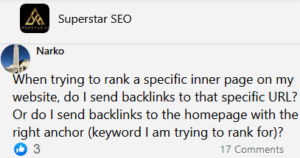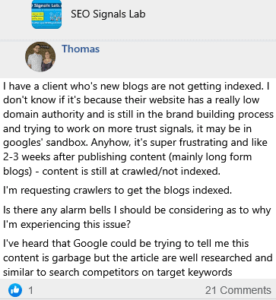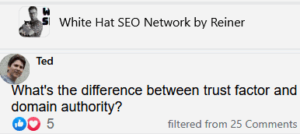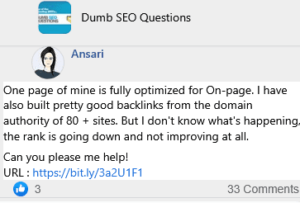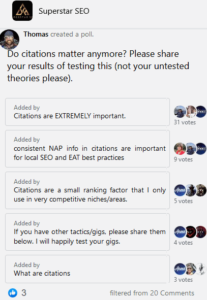Žižović
Can anyone tell me why is PA important at all? Does it influence anything, and how much?
3 👍🏽 3
[filtered from 22 💬🗨]
If you mean Page Authority, it is actually the more important metric, by far, than Domain Authority. Because Google ONLY measure links at the individual URL level, never at the domain level.
👍🏽🤭13
👏
Nallawalla
A personal assistant is an extremely important person, who keeps riff raff away from the boss. I don't believe in page authority and domain authority, but lots of others do.
👍🏽🤭6
You people so have some really strange associations when it comes to PA, I must say. 🙂
Nallawalla
Haha. Being a ham radio person, I see "power amplifier" first when I see "PA".
🤭1
Hamed
Page authority has no value, it's a third-party metric and Google never uses such metrics to evaluate your website. It's PURE BS.
😢👍🏽2
Yes because it is a third party metric and not used by Google. However useful as Page Authority helps as a proxy measure for Page Rank, Quality Links to a page etc. all stuff important to Google
Jarvis
A tool like Ahrefs uses UR (which is similar to PA) to determine the importance and "weight" of page. In theory if you were going to get a link from site you'd want it on the page with higher PA/UR or whatever metric you'd use. A good example is getting a link from "blogspot" (which is useless). The domain authority (DA/DR/Whatever) is going to be really high, but the PR/UR is going to be 0.
Martinez 🎓
Page Authority is a 3rd-party metric created by Moz to approximate what Google's PageRank might be. It's a guess based on 3rd-party data.
If you're going to use 3rd-party metrics to guess how well you're doing, then page-level metrics are the way to go.
Just understand that they cannot be accurate, ever. Imagine the most popular chef in the world stands in a parking lot, serving meals to the homeless. Your friend decides he wants to do that, too. So he sets up a parking lot kitchen based on what he can see of the chef's rig (but he can't get a very good view). He tries to cook similar meals, and some people tell him they taste the same as the chef's and some people tell him they don't taste the same.
That's about the way it works with SEO metrics.
💟👍🏽3
Ammon Johns 🎓
Just to add to what Michael
said, which I substantially agree with, you really have to understand the math and mechanics of PageRank, at least in the theory, to get anything of value at all from any link analysis tool (other than warning you of broken links, of course).
Almost none of the tools tell you how they model the difference between the Random Surfer model of PageRank (the oldest, long outdated, original version), the Intelligent Surfer model, the Reasonable Surfer model, etc. Those create significantly different weight distributions, even at single percentile differences in link weighting.
Even the 'Reasonable Surfer' model is something that was discussed 10 years ago, and has almost certainly been continually innovated with, refined and improved.
https://www.seobythesea.com/…/googles-reasonable…/We are literally decades past the first appearance of things like Page Segmentation, Shingling, etc, all of which change the value of any content, including links, by what section of a page it appears in, so that a link in the footer is not treated the same as a link in the Nav menu, and neither is the same as a link right in the middle of the main content as a part of the flow of that text (i.e. not an ad).
Beyond all of the above technical stuff, which you absolutely need to have at least a basic working understanding of if you want to be any kind of effective link builder, is the simplest stuff of all, which STILL eludes the majority of people spamming inboxes with offers to sell links with "high DA" (links don't have DA, not even in MOZ).
If two pages have the same PageRank (or any other metric of link 'juice' to the page), and one of them has a navigation menu with only 20 links in, and only 5 links otherwise on the page, one of which is to your URL, then you have 1/25th of the passable link value of that page coming through that link. If the other page with that same PageRank had a total of 100 links in its various drop-down navigation menus, and 5 links in the footer, and there were ten links in total in the main body of content, then that link is only passing 1/115th of the page value, nearly 5 times less actual PageRank. (This is simplified to remove any weighting difference between nav links and content links, of course, but the end result is not that far different).
In other words, a link from a page where it will be 1/25th the value is better than a link from a page with 4 times more tool reported Page Authority where your link would be 1/115th of the passable link values. Tools never tell you that. None of them do something as simple as examine the average number of links per page on a domain to factor in to the likely end value of adding one link to one page there.
SEOBYTHESEA.COM
Google's Reasonable Surfer Model: How Link Value Differs Based on Link, Document Features and User Data
💟👍🏽5
yes, that is about it in total.
Žižović ✍️ » Ammon Johns
Thanks for the explanation. I appreciate it. What my question was all about is Page Authority Score, that many call just PA. 🙂
As far as I see, the PA Score is all about the website Domain Authority Score + Number of Linking Domains (more or less). What is the use of the PA Score other than to check how many linking domains are pointing to the page? Or I am missing something? 😕
Ammon Johns 🎓 » Žižović
PA or Page Authority is just the name MOZ (called SEOMoz then), and specifically Rand Fishkin gave to their own home-made version of PageRank. Just like Google, the real math is done on the individual URL level, not the domain level. PA is the 'real' metric.
Domain Authority is a term SEO users made up all by themselves as a shorthand way to talk about the overall links of a domain and how that might flow through all of the site via the internal links.
There is no known Google equivalent for DA and it is NOT based on any known Google metrics, patents, or algorithms, at all. In addition, the ONLY time a DA score or metric would have ANY value to an SEO is if you were getting a run-of-site link from every page in the domain. So DA has no bearing at all on anything any known Search Engine does.
But DA sounds important, makes big numbers, and is easy to manipulate, so idiots love it. At least it keeps them away from spoiling anything that matters.
Žižović ✍️ » Ammon Johns
Thanks for the clarification of the favtors. Still, when we look at a Search Engine Result Page (SERP) for a certain keyword, we can see that the links positions often seem almost as sorted by their DAs, from high to low, with only an exception or two. 😕
How do you explain that?
Barot
Google ranks website pages that means PA metrics ll guide you to rank particular page and its keyword. DA is for root domain value, the metrics is based on links and Google do rank you if you have perfect linking internally or backlinks.
Žižović ✍️
But still, when we look at a Search Engine Result Page (SERP), rankings are often almost entirely according do Domain Authority, and not so much about Page Authority of each of the results. 😕
Domain Authority is a 3rd-party predictive value. It attempts to learn from what you see in the Search Engine Result Pages (SERPs). It's not a very reliable predictive mechanism, though.
It's about as useful as, say, the Alexa Top 1000 rankings. Those sites obviously have a much better chance of ranking in competitive queries than something in Alexa's 900,000-1,000,000 rankings.
Ammon Johns 🎓 » Žižović
in addition to what Michael
already said, one of the ways that MOZ tweak and balance their DA metric is to look at the SERPs and balance their link weighting until it most closely matches as they can.
However, you are still very majorly mistaken.
You see DA, just like PageRank is keyword independent – it is just a measure of link weight, not in any way weighting DA higher or lower for having on-topic or off-topic links. The site that has a thousand links pointed to it where all of those links are to a funny page with a meme image on it has exactly the same DA as the site with ten articles that are in depth, rank well, and each got 100 links.
What is the DA of Google.com? How does Google rank for 'leopard print bedding'? Does the site that is ranked top have higher DA than Google? So, many, many higher DA sites than those in the SERP are not ranking, right?
Once you work out what that means, you'll have a better appreciation of what the comments above are saying.
Martinez 🎓 » Žižović
Also, remember that spammers target Domain Authority for manipulation. Well-intentioned people also try to improve it, so the algorithm's predictive value is diminished by all these attempts to inflate scores.
These may satisfy you:
» The Difference Between Trust Flow and Domain Authority
» Define! What Is High-Quality Content?
